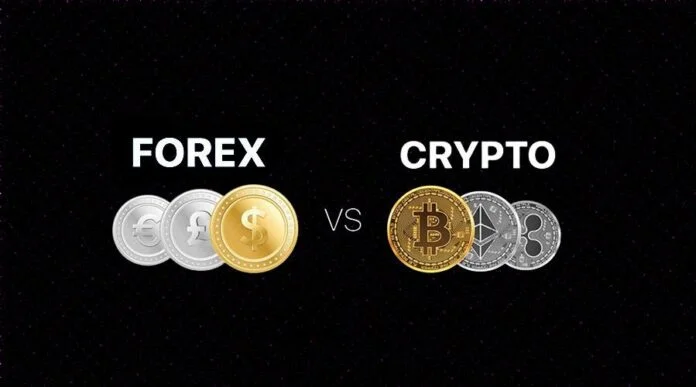In the ever-evolving world of finance, two prominent investment avenues have emerged as the darlings of traders and investors alike: Forex Trading and Crypto. Both offer exciting opportunities and significant profit potential, but they differ in fundamental aspects. Understanding the disparities between these markets is crucial for making informed investment decisions. In this comprehensive guide, we’ll explore the key differences between Forex Trading and Crypto, delve into their mechanics, risks, and rewards, and equip you with the knowledge to navigate either or both with confidence.
Forex Trading: Mastering the World of Foreign Exchange
What is Forex Trading?
Forex Trading, short for foreign exchange trading, is the act of buying and selling currencies in the global market. It revolves around currency pairs, such as EUR/USD or USD/JPY, where one currency is exchanged for another. The forex market operates 24 hours a day, five days a week, and boasts immense liquidity, making it the largest financial market globally.
Advantages of Forex Trading
- High Liquidity: The forex market’s vast size ensures high liquidity, enabling swift execution of trades without significant price fluctuations.
- Leverage: Traders can access leverage, allowing them to control larger positions with a fraction of the capital.
- Diverse Trading Strategies: Traders can employ various strategies, such as technical and fundamental analysis, to capitalize on market movements.
Risks of Forex Trading
- Market Volatility: The forex market is highly sensitive to economic, political, and geopolitical events, leading to substantial volatility.
- Leverage Risks: While leverage amplifies profits, it also magnifies losses, potentially leading to significant account drawdowns.
- Exchange Rate Fluctuations: Exchange rates can be influenced by factors beyond traders’ control, leading to unexpected losses.
Crypto: Decoding the World of Digital Assets
What is Crypto?
Crypto, short for cryptocurrency, is a form of digital or virtual currency that utilizes cryptographic technology for secure financial transactions. Unlike traditional currencies, cryptocurrencies operate independently of central banks and governments. Bitcoin, Ethereum, and Ripple are some of the well-known cryptocurrencies.
Advantages of Crypto
- Decentralization: Cryptocurrencies are decentralized, meaning they are not controlled by any central authority, providing users with financial autonomy.
- Transparency: All cryptocurrency transactions are recorded on a public ledger called the blockchain, ensuring transparency and security.
- Potential for High Returns: The crypto market’s volatility presents opportunities for substantial returns on investment.
Risks of Crypto
- Volatility: Cryptocurrencies are infamous for their price volatility, with values subject to rapid and unpredictable fluctuations.
- Regulatory Uncertainty: The lack of consistent regulations in the crypto space may expose investors to legal and security risks.
- Security Concerns: Cybersecurity threats, such as hacking and scams, pose risks to cryptocurrency holdings and transactions.
Forex Trading vs. Crypto: Key Differences
Market Dynamics
Forex Trading involves traditional fiat currencies issued and regulated by governments and central banks. The forex market operates within a well-established framework and responds to economic indicators and geopolitical events.
On the other hand, Crypto operates in a relatively nascent and rapidly evolving space. The market dynamics are influenced by factors unique to the digital realm, such as blockchain technology advancements and community sentiments.
Market Hours
Forex Trading operates 24 hours a day, five days a week, following the global financial centers’ time zones. This continuous trading allows traders to respond to real-time events worldwide.
Crypto markets, in contrast, operate 24/7, enabling continuous trading without time restrictions. This round-the-clock accessibility appeals to traders from different regions and time zones.
Liquidity
The forex market’s vast size and daily turnover in trillions of dollars ensure high liquidity, making it relatively easy to enter or exit positions without significantly impacting prices.
Crypto markets, while growing in liquidity, may still experience liquidity issues, particularly with less popular or lower-market-cap cryptocurrencies.
Regulation
Forex Trading is extensively regulated by governments and financial authorities worldwide. Regulated forex brokers adhere to strict compliance standards, offering traders a sense of security and protection.
Crypto, being decentralized, lacks universal regulation, leading to varying levels of regulatory scrutiny depending on the region. The absence of regulation can expose investors to potential risks.
Which Path to Choose?
The decision to opt for Forex Trading, Crypto, or both depends on your risk tolerance, investment goals, and trading preferences. Consider the following factors:
- Risk Tolerance: Forex Trading may suit those seeking relatively stable markets, while Crypto attracts risk-tolerant investors who embrace volatility.
- Market Understanding: Choose the market you understand best to make informed trading decisions.
- Diversification: Diversifying your portfolio with both Forex and Crypto can spread risk and potentially optimize returns.

